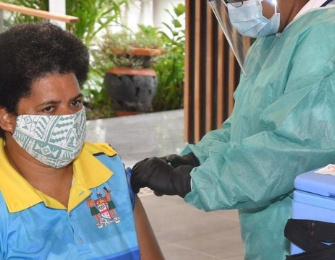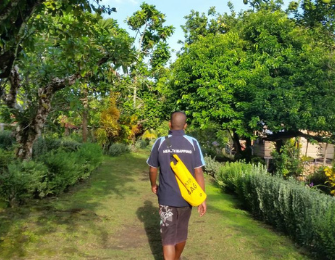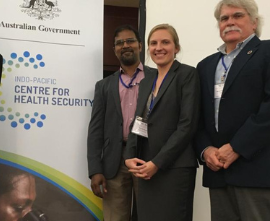The Fiji Government has led a national COVID-19 vaccination rollout resulting in more than 98 percent of the adult population being vaccinated in the past year.
In addition to the Australian Government supplying Fiji with more than 1.4 million COVID-19 vaccines to date, through Pacific Women Shaping Pacific Development our Government has also provided funding for the Fiji Women’s Rights Movement (FWRM) to conduct a Rapid Needs Assessment on the attitudes of Fijian women towards COVID-19 vaccines.
The online survey conducted in English and the iTaukei language during two weeks in June 2021 attracted 574 respondents. While this represents only a small sample and may not capture perceptions of Fijian women in the wider community, the findings remain useful in highlighting opportunities for addressing gendered barriers to COVID-19 vaccination.
The survey, conducted at the time of the second wave of COVID-19 cases in the country, found 38.6% of respondents were positive about the vaccine and 51% of respondents can be described as ambivalent about the vaccine. Only 10.9% of respondents were negative about the vaccine.

The survey indicates that a woman’s education level and her income levels are significant factors in influencing uptake of the COVID vaccine. Demographics such as age, marital status and sexual orientation also played a noticeable role in influencing a Fijian woman’s uptake of the vaccine. Additionally, those women who were not carers and did not have a disability or long-term health condition were more accepting of the COVID-19 vaccine. Other gendered barriers that were identified as affecting uptake and access include: a lack of confidence in the safety and efficacy of the vaccine; long queues at vaccination sites, combined with a concern regarding a lack of physical distancing; distrust in Government systems; transport barriers and long distances to vaccination sites; and online registration processes and the documentation it requires.
Respondents also reported negative messaging on social media platforms and vaccine mandates as further concerns affecting vaccine acceptance.
In the report, FWRM makes both operational and policy related recommendations intended to improve access for Fijian women. At an operational level, one recommendation related to ensuring vaccine workforce were following COVID-19 prevention measures such as proper masking to allay fears that some Fijian women held that queuing and interacting with health workers at vaccination sites put them at risk of contracting the virus.
 Policy recommendations include improved dissemination and reporting of sex disaggregated vaccine data; close collaboration with the government department responsible for gender in addition to women’s NGOs, the community and faith-based organisations to counter anti-vaccine messages; and a review of data policies and communications policies and strategies to ensure they consider gender and the cultural context.
Policy recommendations include improved dissemination and reporting of sex disaggregated vaccine data; close collaboration with the government department responsible for gender in addition to women’s NGOs, the community and faith-based organisations to counter anti-vaccine messages; and a review of data policies and communications policies and strategies to ensure they consider gender and the cultural context.
Findings were presented to the Vaccine Taskforce within the Ministry of Health. Nalini Singh, Executive Director of the Fiji Women’s Rights Movement says the report was well received and the findings informed the national roll-out. For example, Nalini acknowledges that the drive through vaccination sites which were a major feature of Fiji’s vaccine roll-out were important in addressing access barriers and in mitigating the concerns of Fijian women in attending vaccination sites. This research highlights the value of analysis which improves our understanding and addresses the needs of women, men and gender diverse people and the barriers they face in accessing COVID-19 vaccinations.
Learn more about our Vaccine Support for Fiji under the Vaccine Access and Health Security Initiative.


